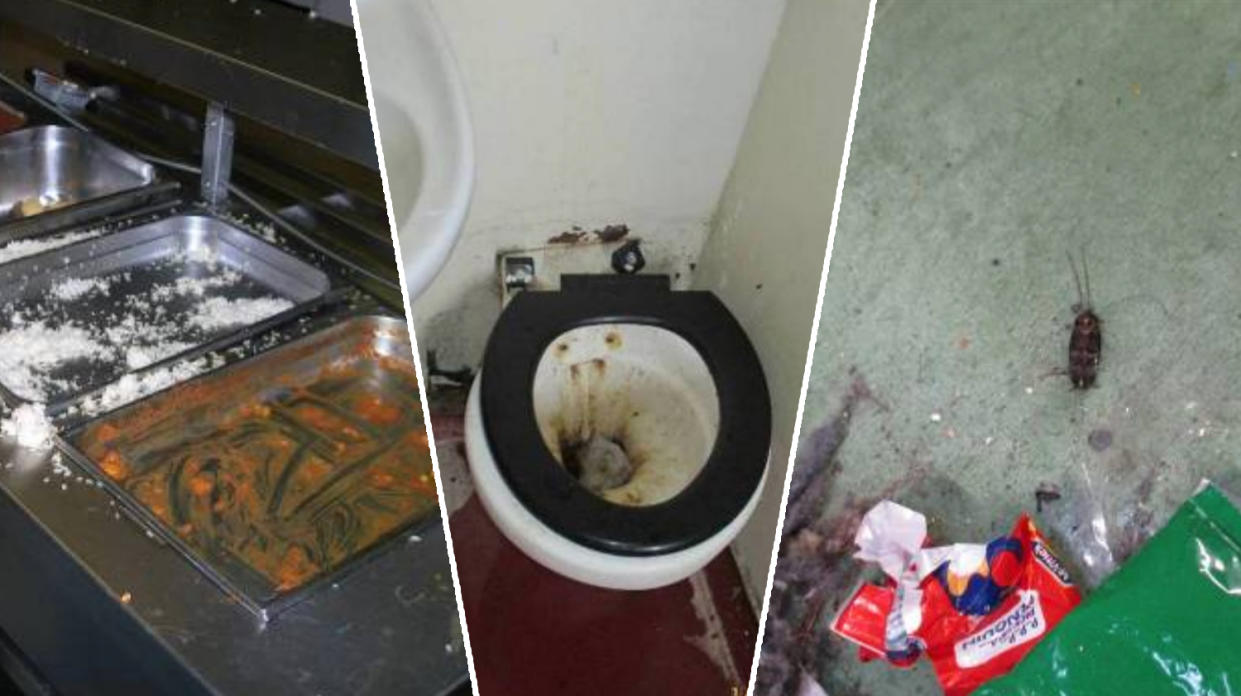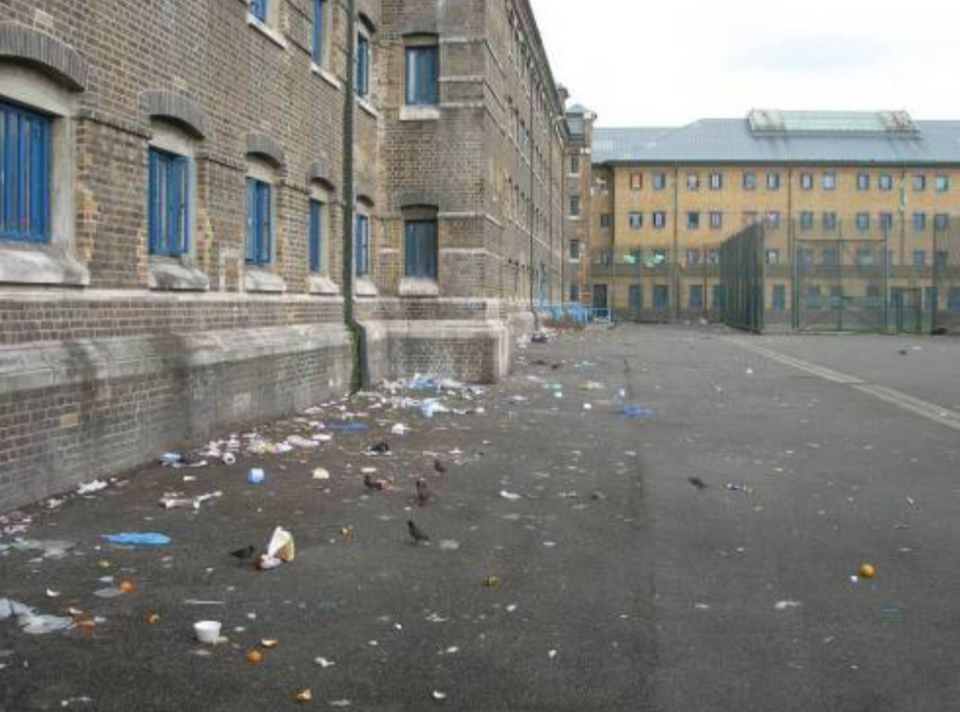British prisoners say conditions so bad they are being 'tortured'

Conditions inside British jails are so bad prisoners feel they are being ‘tortured’.
A new report by Her Majesty’s Inspectorate of Prisons reveals conditions are so cramped and ventilation so bad many prisoners are having their human rights breached.
The report states many inmates have to defecate just feet from their cellmates separated by nothing but a curtain. Others spend up to 22 hours a day in cells that have broken windows, poor ventilation and heating, graffiti, damp, exposed wiring and vermin.
An ex-prisoner named Cranni, who served time in various prisons around the UK, echoed these findings: ‘During one six-month period I was let out of my cell only once – to go to the library for 20 minutes.
‘On Fridays, we were locked into our cells at 5pm. We’d be let out to collect our food from the servery over the weekend, and that was all.
‘The conditions felt like torture. The mattresses were so old you’d get a better night’s sleep on the floor. I spent the first two years of my sentence sleeping down there instead of on the metal bed frame.
‘Lots of prisoners develop back problems and the poor lighting leads to eye problems, too. I’ve lost my sight in one eye; many prisoners lose their eyesight entirely.’
The report also released a series of images showing the disgusting living conditions and communal areas.
It quotes serving prisoners revealing what life is like behind bars.
The report found 31% of prisoners were, by their own definition, kept in overcrowded conditions and in some prisons this rose to 48%.
This equates to around 21,000 prisoners out of the 85,000 currently incarcerated.
One prisoner said: ‘J wing has had a problem with the heating, and every winter for three years since being on this wing, most prisoners (including myself) have been left freezing in our cells. The Governor and staff have been repeatedly told, but they just tell us to deal with it and it is like torture every year.’
Another stated: ‘My cell that I’m currently in there is not enough oxygen coming through my vents on my window, I am already very claustrophobic and find it very difficult to breathe and feel this is very wrong and would like either a fan or the window to be open so air can get in the cell.’

The European Committee for the Prevention of Torture and Inhuman or Degrading Treatment or Punishment (CPT) states the ‘minimum’ required conditions for prison cells are:
Six m² of living space for a single-occupancy cell plus sanitary facility,
Four m² of living space per prisoner in a multiple-occupancy cell plus fully-partitioned sanitary facility,
At least 2m between the walls of the cell at least 2.5m between the floor and the ceiling of the cell.
While most single-sex cells met the required minimum (except for sanitary facilities), most multi-occupancy cells failed to meet the standards.
‘I had to eat my food while watching another man take a crap,’ Cranni said, ‘it’s very unhygienic.’

The report also showed HMP Birmingham was housing between four to six inmates in one cell in ‘cramped’ conditions.
Cranni continued, ‘Cat C prisons are the phenomenal problem. Cat A and B prisons are normally quite decent because you’ve got people spending 5, 10, 15 years in there so they have to be.
‘But in Cat C’s, where people can be moved around regularly, lads are all just crammed in together, especially when the prison is short-staffed.
‘It’s incredibly tough anyway, but if you’ve got mental health problems it’s even worse. And people need meaningful tasks, instead of just creating letters for the post office.’
Additional criteria highlighted the importance of cleanliness, access to natural light and ventilation, outdoor exercise and purposeful activities.
And with the number of UK prisoners rising each year, it is clear that conditions are only getting worse.
Currently, the prison population is 85,375 – only 1,124 below the ‘useable operational capacity’.
This number has almost doubled since the 1990s.
Staff shortages and a growing number of inmates have resulted in prisoners being kept inside their cells for up to 22 hours a day – far higher than the recommended 14.

Despite the Government’s plan to recruit 2,500 new front-line officers, staff numbers are dwindling and attrition rates are even worse.
‘The main problem is the lack of staff,’ one ex-prison officer, who wanted to remain anonymous, told Yahoo News UK.
‘Conditions deteriorate with less staff because we were asked to do more and had less time to do it.
‘You’re run ragged and you have less time to get to know the prisoners.
‘Without getting to know your prisoners, you’re just another black and white staff member to them.
‘And if they’re stuck in their cells getting frustrated for hours on end, the first thing they do when they get to leave the cell is take it out on someone.’
The ‘purposeful activity’ criteria suggests inmates spend at least 10 hours a day during the week outside of their cells.
The research found this was ‘rarely achieved’ and prisoners were spending an ‘enormous’ period of time locked inside their cells.

Only 14% of prisoners surveyed said they received this recommended period of time and 21% reported spending less than two hours outside on the weekdays.
Rates at the weekend are different due to varying routine, but those inside at HMP Onley (2016) were often locked up for periods of up to 26 hours.
Chronic staff shortages at this prison meant inmates had an unpredictable routine for two years, regularly not knowing when they would be released from their cells for the day.
‘Every jail is different,’ the officer continued, ‘but the one I worked at had multi-occupancy rooms with a toilet with no lid.

‘The inmates were expected to do everything next to an open toilet – it was pretty awful.
‘Conditions have always been like this but short staffing has made it worse.’
This lack of stimulating day-to-day activity is driving prisoners towards drugs, warned HM Chief Inspector of Prisons Peter Clarke.
He said: ‘The aspirations of the prison reform programme will not be met if prisoners are confined in conditions that embitter and demoralise, leaving them unable to access rehabilitative activities and, all too often, turning to illicit drugs to break the boredom born of long periods locked in their cells.’
Today, at the annual Prison Governors Association conference, President Andrea Albutt urged the Government to review their current policies.
‘The Government must be brave and reduce the prison population and don’t worry about votes. Don’t dabble, just do it because morally it is the right thing to do.’ she said.
‘Invest as a matter of urgency in our existing prison estate to make it fit for purpose in the 21st century.’
Peter Dawson, director of the Prison Reform Trust described the conditions as ‘shameful’: ‘This report describes a stain on our national reputation and reveals the dreadful truth about conditions in much of our overcrowded prison system.
‘A significant reduction in our unnecessary and unmerciful resort to this most severe of punishments is an essential first step to a prison system of which we can feel proud rather than ashamed.’
It costs an estimated £65,000 to keep a person in prison in the first year, and around £40,000 a year from then on.
‘The element of punishment in prison is supposed to be about losing your liberty’, Cranni said, ‘it’s about leaving your community and not being able to spend time with your loved ones. It shouldn’t involve conditions like these.
‘I’m not just speaking about myself here, but thousands of men. In order for things to change, people need to talk about prison – it’s the last social taboo.’
READ MORE:
Criminals deliberately reoffending to smuggle drugs back into prison
Pentonville inmate killed in prison ‘war’ over cell where drones delivered mobiles and drugs
Homeless man asks judge to send him to prison for birthday ‘so he can wake up somewhere warm’
A Ministry of Justice spokesperson said: ‘We are investing £1.3bn to modernise the prison estate, closing older prisons that are not fit for purpose and creating in their place high-quality, modern establishments.
‘This will help deliver prisons that are more safe and secure, so our staff can work more closely with offenders to change their lives and turn their back on crime for good.
‘Our work in this area is supported by a drive to recruit an extra 2,500 prison officers, who will boost the front line and help turn our prisons into places of reform.’

 Yahoo News
Yahoo News 
